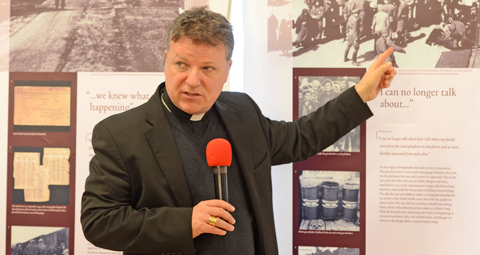BY Ian Dunn | December 15 2017 | ![]() 0 COMMENTS
0 COMMENTS ![]() print
print

Pope’s Our Father suggestion considered by Scottish bishops
Publication Date: 2017-12-15
Holy Father’s discussion on altering key line is cautiously welcomed by bishops Keenan and Taylor
Scottish bishops have given a cautious welcome to Pope Francis’ suggestion that the Our Father could be changed, saying that ‘lead us not into temptation’ is ‘not a good translation.’
In an interview on Italian TV, the Pope said: “I am the one who falls: it’s not [God] who pushes me toward temptation to see how I fall. A father doesn’t do this, a father helps us to get up right away.”
He noted that this line was recently re-translated in the French version of the prayer to read: “Do not let me fall into temptation.”
The Latin version of the prayer, the authoritative version in the Catholic Church, reads: “Ne nos inducas in tentationem.”
The Pope said that the one who leads people into temptation ‘is Satan; that is the work of Satan.’ He said that the essence of that line in the prayer is like telling God: “When Satan leads me into temptation, please, give me your hand. Give me your hand.”
Just as Jesus gave Peter His hand to help him out of the water when he began to sink, the prayer also asks God to ‘give me your hand so that I don’t drown,’ Pope Francis said.
The Holy Father made his comments in the seventh part of the Our Father television series. Filmed in collaboration with the Vatican, the series consists of nine Q&A sessions with Pope Francis and Fr Marco Pozza, a theologian and a prison chaplain. In each of the sessions, Fr Pozza asks the Pope about a different line in the Our Father prayer, and the Pope offers his insights.
Bishop John Keenan of Paisley Diocese said that ‘pastorally it sounds very sensible’ but there was a need to consult Scripture scholars and see ‘if this new suggestion faithfully translates the sense Jesus’ words meant to convey.’
Complex translation
Bishop Emeritus Maurice Taylor of Galloway Diocese, who was chair of the Episcopal Board of the International Commission on English in the Liturgy (ICEL) from 1997-2002, said translating from the original Greek was complex.
“Apparently, the problem is the ambiguity of the Greek word ‘peirasmos,’ translated usually as ‘temptation,’” he said.
“Until now, the explanation has been ‘Do not allow us to fall/be led into temptation’ or, sometimes, ‘Do not put us to the test,’ understanding ‘temptation’ in a neutral sense of ‘test’ (rather than ‘temptation to sin’) as God put Job to the test.”
“On the whole, I agree with Pope Francis since the normal and obvious meaning that people take from the phrase is a misleading interpretation that has to be explained or explained away,” Bishop Taylor said.
“However, since change from the familiar is always reluctantly done, it might be wise to check whether any other changes in the wording of familiar prayers are advisable and make the changes together and not increase the occasions for the inevitable complaints of ‘why?’ and ‘must we?’”
“I hope that, before any decision on the matter is taken by the bishops, they may first be interested in the opinions of those who are users of the prayer, namely the people, clerical and lay.”
The Pope’s remarks do not change the translations of liturgical texts. Such a change would begin with a resolution by the Bishops’ Conference of Scotland.
Courage
In a previous episode of the Our Father series, Pope Francis said ‘it takes courage’ to recite the prayer, because it means calling on someone else and truly believing that ‘God is the Father who accompanies me, forgives me, gives me bread, is attentive to everything I ask, and dresses me better than wildflowers.’
To believe ‘is a great risk,’ and means daring to make the leap of Faith, he said. Because of this, ‘praying together is so beautiful: because we help each other to dare.’










